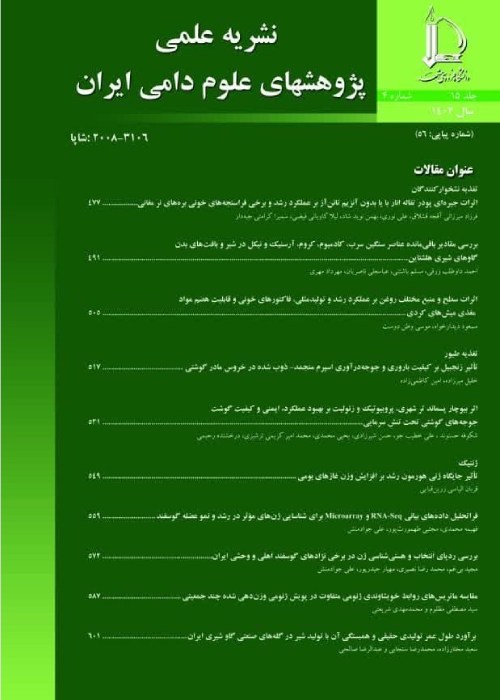Effect of Urtica dioica on Serum Parameters and Genes Expression of Nitric Oxide Synthase and Endothelin-1 in Broiler Chickens Involved in Pulmonary Hypertension
Modern strains of broiler chickens are susceptible to pulmonary hypertension syndrome (PHS) because of the mismatch between oxygen demanding muscles and oxygen-supplying organs (i.e. heart and lungs). Intensive genetic selection for rapid growth over the past several decades has reduced allometric growth of the heart and lungs in modern broiler chickens compared with their chronological counterparts. The susceptibility of broilers to PHS is exacerbated whenever they are raised at high altitudes where the availability of atmospheric oxygen is limited. Pulmonary arterioles in broilers respond to hypoxia by vasoconstriction and if the situation sustains, broiler develop pulmonary hypertension with subsequent right ventricular failure that finally leads to ascites. Research has addressed the impact of nutritional factors including energy, protein, electrolytes and feed restriction on the development of PHS. However, the effects of herbal medicine in the prevention and control of PHS in broiler chickens have not been adequately studied. Urtica dioica is a medicinal herb that belongs to the family of Urticacea and it grows in most parts of the world. Urtica dioica is used because of antioxidant and anti-inflammatory compounds for the treatment of cardiovascular, respiratory, cancerous and allergic diseases. One of the important effects of this plant is the reduction of blood pressure. The purpose of the present study was to examine the effects of different levels of this medicinal plant in preventing pulmonary PHS in broiler chickens.
The experiment was conducted in the experimental facility of Shahrekord University, Shahrekord, Iran, which had an altitude of 2100 m above sea level. A total of 240 day-old broilers (Ross308) were randomized across16 floor pens (15 birds per pen). A control diet based on corn and soybean meal were formulated for the starting (1–3 weeks of age) and growing (4–6 weeks of age) stages according to NRC (1994) recommendations. Three additional diets were prepared by substituting 0.5%, 1%, and 1.5% Urtica dioica for wheat bran in the control diet. At 42 days of age, 8 birds per treatment were selected for blood collection and then killed by decapitation. Blood samples (3mL) were collected from the brachial vein. Serum samples were used for the determination of nitricoxide (NO), malondialdehyde (MDA), urea, albumin, alkalin phosphatas (ALP), alanine amino transaminase(ALT) and aspartat amino transaminase(AST). To measure the expression of the gene, the heart and lung samples were harvested and the right ventricles dissected and immediately frozen in liquid nitrogen and stored at -70°C for subsequent RNA analysis. The levels of nitric oxide synthase (NOS), Endothelin 1 (ET-1) and β-actin transcripts were determined by real-time reverse transcriptase (RT)-PCR. Results were compared by GLM using SAS (2007) software in a completely randomized design. Means were separated by Duncan's multiple range test.
The results of the experiment showed that broiler chickens fed a diet containing 0.5 to 1.5% Urtica dioica leaves, the efficiency of heart and liver weight relative to the live weight of the chickens and right ventricular ratio to total ventricles showed a significant decrease compared to control group (P<0.05). Birds received Urtica dioica at 1 and 1.5% had significantly (P<0.05) higher circulatory concentrations of nitric oxide, protein and albumin though significantly (P<0.05) lower serum concentrations of malondialdehyde, alkaline phosphatase, alanine amino transaminase and aspartate amino transaminase when compared to the birds fed the control diet. The expression of endothelin 1 (ET-1) and nitric oxide synthase (NOS) genes in the heart and lung of broiler chickens has been affected by feeding Urtica dioica to broiler chickens. NOS gene has been highly over expressed in the heart and lung of broilers fed Urtica dioica from 1 to 1.5 % increase relative to the control. On the other hand, Urtica dioica significantly suppressed the expression of ET-1 in the heart and lung (P<0.05). The Urtica dioica contains polyphenolic compounds, including phthalides and flavonoids, which have antioxidant properties. This compound can prevent oxidative stress by scavenging of reactive oxygen species (ROS), activation of antioxidant enzymes, metal chelating activity. It also causes more nitric oxide secretion from vascular endothelial cells and opening of potassium channels. The Urtica dioica extract prevents the destruction and necrosis of the liver cells and maintains the consistency of the liver tissue and has a stabilizing effect on hepatocytes.
In conclusion, levels of 1 to 1.5% Urtica dioica in the diet can significantly prevent PHS in broiler chickens reared at high altitudes. Beneficial effects of this medicinal plant are attributed to vasorelaxant and antioxidant actions that mediated through polyphenolic compounds Therefore, Urtica dioica is a promising medicinal herb to prevent pulmonary hypertension in broiler chickens reared at high altitude.
- حق عضویت دریافتی صرف حمایت از نشریات عضو و نگهداری، تکمیل و توسعه مگیران میشود.
- پرداخت حق اشتراک و دانلود مقالات اجازه بازنشر آن در سایر رسانههای چاپی و دیجیتال را به کاربر نمیدهد.



